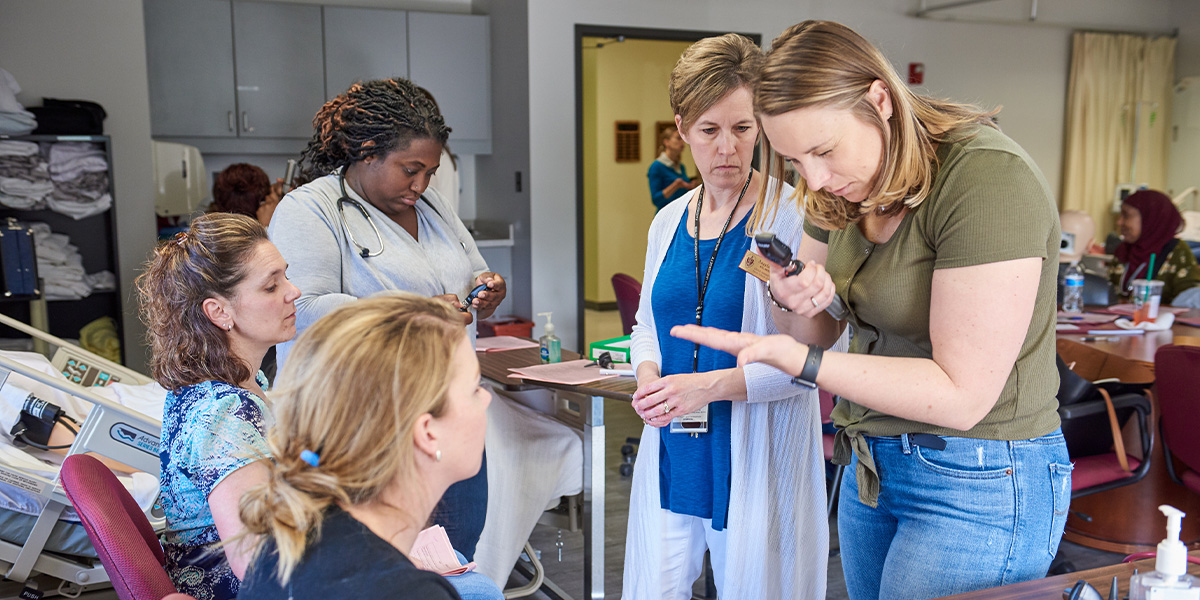Designed for your Life as a Nurse
Guided by Catholic values with an emphasis on human dignity, Walsh University’s online advanced nursing programs will help you to apply practical methods and techniques to address physical and mental health concerns among diverse populations. Through 1:1 faculty guidance, you’ll become a compassionate, skilled nursing professional equipped to support communities and respond to unique health challenges among populations in a complex world.
Choose from These Available Specializations
With our specialized practice options, professionals who possess a bachelor’s or master’s degree, depending on the program, can choose from these specializations:
Complete your coursework 100% online. Engage in a flexible program that teaches core competencies, focuses on healthcare in practice, informs on ethical, legal and professional foundations and explores diverse cultures and communities. Clinical experiences within your own community help you build experiential hours to gain licensure and enter the field, ready to support others.
Fast Facts
Graduate Prepared. Nurse Ready
Develop advanced clinical skills and expand care in your community as an advanced practice nurse.
Flexibility
Choose from multiple starts per year and complete your coursework 100% online.
Core Knowledge
Engage in a flexible program that teaches core competencies and prepares post-baccalaureate Registered Nurses for an advanced career.
Clinical Placement Services Included
We offer placement support to assist you in finding suitable clinical sites and preceptors for your clinical courses..
Online Nursing Programs: Clinical Placement Support
Walsh is committed to your academic success and as such, provides clinical experience support resources at no additional cost. We know finding preceptors for clinical rotations can be one of the most challenging and stressful parts of any advanced nursing program. As a Walsh University Nursing student, you’ll be paired with a clinical placement coordinator who will collaborate with you to secure clinical sites and preceptors for your clinical courses.
Frequently Asked Questions
Clinicals are a required portion of the program that allow you to apply the skills you learn in real-life situations.
As a Walsh MSN student, you’ll be paired with a clinical placement coordinator who will collaborate with you to assist in securing clinical sites and preceptors for your clinical courses.
- Online MSN-FNP program includes 3 clinical rotations for a total of 700 clinical hours.
- Online MSN-PMHNP program includes three clinical rotations for a total of 600 clinical hours.
Our online nursing programs are offered in full- and part-time formats so the programs can be balanced with your current job or other responsibilities. As such, the time to completion will vary by format and specific program. However, in general, programs can be completed in 2 to 4 years, depending on the program.
- The Online MSN-PMHNP program consists of 48 total credit hours. You can complete the program in as little as two years as a full-time student, with a part-time option also available.
- The Online MSN-FNP program consists of 45 total credit hours. You can complete the program in as soon as 2 years as a full-time student, but there are also part-time options available. Depending on your schedule, you can choose to take just one or two courses at a time to balance with working full-time.
- The Online MSN-NE program consists of 42 total credit hours. You can Complete in as little as 3 semesters, eight-week courses.
Yes, we offer competitive tuition rates at $775 per credit hour, and we also have a variety of financial aid options available. Visit our Tuition and Financial Aid page for more details.
Residency requirments for Online MSN specialization:
- Online MSN-PMHNP program: you’ll participate in two intensive experiences: one online and one in-person on the Walsh University campus. The on-campus experience provides hands-on learning, workshops and training.
- Online MSN-FNP program: you’ll participate in two intensive experiences beginning in your second year. The first intensive experience will be virtual and requires no travel. The second intensive experience will be in-person on the Walsh University campus for two days of hands-on learning, workshops and training.
With 100% online coursework, our nursing programs are designed for working professionals. While the online coursework remains flexible, it is important to note that to complete your clinical hours, you may need to adjust your work schedule to accommodate your clinical hour requirements.
Students should plan to devote a minimum of 20 hours per week to clinical hours. If you plan to work full-time while in the program, your schedule must accommodate these requirements. These courses take place toward the end of the programs, so you’ll have time to figure out what would work best for your situation.
Throughout this program, you will connect with your classmates and faculty through group work, discussion boards and peer feedback sessions to ensure an online program centered around collaboration and interactivity. Instructors also host one-on-one office hour opportunities to help you remain connected with your coursework and engaged with the Walsh community.
In addition to your in-class studies, the clinical portions of these programs allow for hands-on, practical experience. Students receive instruction and interaction within students' own communities, including individual and group supervision. These interactive portions of the program emphasize developing therapeutic relationships, nursing procedures, ethical practice and the application of nursing and mental health theories to various client concerns.
Online Graduate Nursing Programs
Psychiatric Mental Health Nurse Practitioner Specialization
A Commitment to Caring
Walsh’s Psychiatric Mental Health Nurse Practitioner programs will prepare you as an advanced practice nurse while helping to fulfill the nationwide mental health care need. Diagnose mental health disorders, provide psychosocial treatments, prescribe medication and more to promote the mental health and well-being of individuals, families and groups.
Family Nurse Practitioner Specialization
Fill the Growing Need for Primary Care Providers
With a focus on preventative care, health care policy, health promotion, clinical assessment and management, Walsh University’s FNP program can help you to prepare to become a confident nurse practitioner, ready to make a difference in the lives of patients and entire communities as a primary care provider. Our curriculum prepares a qualified nurse to take the FNP National Certification exam.
Nurse Educator Specialization
Tap into your Passion for Education and Quality Care
Prepare to impact the future of nursing with the online MSN Nurse Educator program. Expand your understanding of procedures, skills and clinical reasoning related to health and nursing to improve nursing practice. Nurse Educator graduates will be prepared to teach in a variety of settings and influence the next generation of nursing professionals.
Student Learning Outcomes
- Provide group and individual psychological services and apply mental health best practices.
- Practice chemical dependency counseling, with an understanding of treatment stages and environments.
- Work effectively with diverse populations – including racial, ethnic, religious, cultural, sexual and socioeconomic statuses.
- Utilize research methods in program evaluation, needs assessments and outcome studies.
- Gain advanced skills to provide primary care to patients for a range of medical problems and non-life-threatening acute conditions.
- Focus on the primary care needs of your patients as you advocate for their well-being.
- Explore healthcare technology and data management concepts, theories, legal and ethical implications and application within the healthcare environment.
- Expand your understanding of procedures, skills and clinical reasoning related to health and nursing to improve nursing practice.
- Gain an understanding of creating materials that encourage professional development and training.
- Learn to design and implement curriculum as well as various teaching strategies.
- Be prepared to teach in a variety of settings and influence the next generation of nursing professionals.
The master’s degree program in nursing at Walsh University is accredited by the Commission on Collegiate Nursing Education (http://www.ccneaccreditation.org).




